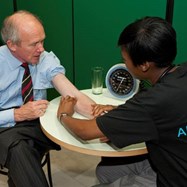Foundation Degree programmes
Some Russell Group universities offer extended degree programmes which take longer than standard degrees, allowing students more time to develop knowledge and confidence. Foundation degrees allow students without traditional qualifications to be taught in a further education college, before making the transition to studying at undergraduate level.
At the University of Liverpool, a foundation year programme for medicine, dentistry, veterinary and allied health professions gives students time to adapt to being in full-time education. The programme is based at two nearby further education colleges and at the university, and is available to students from across the country.
While the foundation year helps the students academically, it also removes risk for mature students, because it guarantees them a place on the relevant degree course if they achieve a certain mark in their exams. Nearly 100% go on to do a medicine, dentistry, veterinary or allied health degree.
The 30-40 students taking the programme each year must have GCSEs and range in age from their 20s to early 40s. They may have worked in healthcare settings, and some may have degrees in non-related subjects.
The strong relationship with the FE colleges is a real strength of the course and both the university and the colleges learn from each other.
The University of Birmingham’s College of Engineering and Physical Sciences runs Foundation Year courses for students who do not hold the required qualifications and who need further preparation.
The University of Nottingham Foundation courses are designed for those whose school-leaving qualifications do not meet requirements for direct entry to undergraduate programmes, for example, an incorrect mix of A-level subjects.
-
Hamir Patel
hamir.patel@russellgroup.ac.uk
020 3816 1316
-
Hollie Chandler
Hollie.Chandler@russellgroup.ac.uk
020 3816 1307
 X
X

